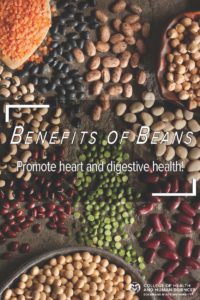By Emilie Hebert
 Beans, beans, the magical fruit! While we know that beans are not fruit, these humble legumes can be somewhat magical in our diets. They are great sources of plant-based protein that promote heart and digestive health. Beans are also inexpensive and versatile! Let’s dive into what the science says about beans and explore fun ways to eat them.
Beans, beans, the magical fruit! While we know that beans are not fruit, these humble legumes can be somewhat magical in our diets. They are great sources of plant-based protein that promote heart and digestive health. Beans are also inexpensive and versatile! Let’s dive into what the science says about beans and explore fun ways to eat them.
What are the benefits of beans?
Fiber. Most varieties of beans pack 5 to 9 grams of fiber per ½ cup! Just one or two servings of beans a day can give you a big boost toward daily fiber recommendations: 25 grams for women under 50, 31 grams for men under 50, 22 grams for women over 50, and 28 grams for men over 50.* Fiber helps you feel full after a meal and keeps your digestive system working efficiently. It can also help regulate blood sugar levels and promote heart health. If you’re wondering which bean has the most fiber, navy beans win with 9 ½ grams of fiber per ½ cup! (*Individual fiber needs are influenced by many conditions)
Protein. Beans are an excellent source of plant-based protein. Half a cup of cooked beans has 7 to 9 grams of protein. Unlike animal-based proteins, beans do not contain saturated fat. When you eat beans, you get the benefits of protein without the heart-health risks associated with eating protein foods high in saturated fat. Different beans contain different amounts of essential amino acids, the building blocks of proteins, so it is important to eat a variety of beans to get a wide spectrum of nutrients.
Micronutrients. In addition to fiber and protein, beans also include a whole host of vitamins and minerals. Beans are rich with zinc, iron, magnesium, and manganese. They also contain antioxidants that fight free radicals to prevent cell damage (oxidative stress). Antioxidant-rich foods help reduce risk for heart disease, stroke, cancer, and other diseases.
Types of beans
Now that you know all about how beans can be a healthy addition to your diet, let’s explore some different types of beans you can try:
- Black beans
- Black-eyed peas
- Chickpeas (also called garbanzo beans)
- Fava beans (also called broad beans)
- Great Northern beans
- Anasazi beans
- Kidney beans
- Lentils (actually legumes)
- Lima beans
- Navy beans
- Pinto beans
- Soybeans
- Adzuki beans
For delicious recipes, nutrition tips, and cooking and nutrition classes, go to the Kendall Reagan Nutrition Center website. More health tips are also available at the College of Health and Human Sciences Pinterest board.